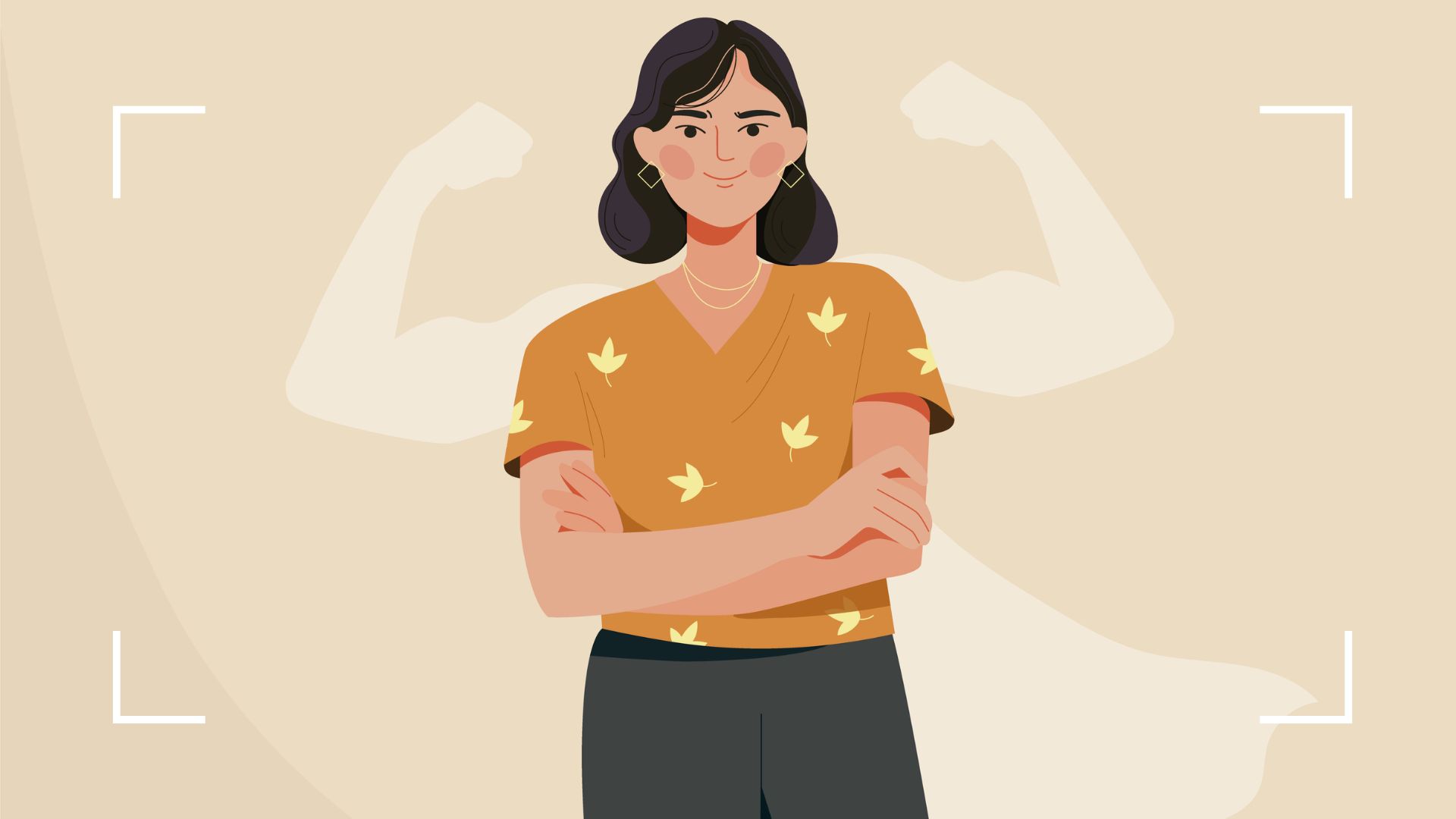I was diagnosed with ADHD as an adult - this is what no one tells you about the symptoms in women
Want to know more about ADHD symptoms in women? Here's what I learned when I was diagnosed


The first time I read an article describing ADHD symptoms in women, mentally ticking off each one as I went, it was as though time stood still. Time did, but my brain didn't. Instead, it whirred through a mental Rolodex of innumerable challenges and upsets where it was just my ADHD.
Too much. Too lazy. Too careless. Too chatty. Too messy, disorganized, hyper, emotional, sensitive. Ironically, I've found that being told I'm 'too much' has only ever made me feel 'not enough' and impacted my self-worth enormously over the years. Heck, it's even a trigger now - sitting snug next to my other nemesis 'lazy'.
ADHD is a disorder resulting from atypical brain development rather than a life-threatening disease, but for those of us fighting our way through a neurotypical world, the often-coexisting conditions can be hugely damaging. We're talking about depression, anxiety, substance abuse, PTSD, and obesity, as well as being more likely to have habitual burnout. The acronym and its comorbidities may sound scary, but that's because this is an incredibly complex and challenging neurological disorder that must not be condescended to.
Once you get to know more about the wonder that coexists with the challenges it presents - you'll see the positive sides. This is my story, along with expert advice, so you can get on the road to making the most of your wonderfully unique mind and living your best life, just like me, if you think you may have ADHD too.
What I learned when I was diagnosed with ADHD as an adult
1. ADHD diagnosis has a gender bias
The image of ADHD as decidedly male and something that occurs in childhood, and the lack of understanding around symptoms of ADHD in women and girls and how these symptoms are exacerbated by societal expectation and hormonal fluctuations, is largely believed by researchers from Reykjavik University to have contributed to a gender bias with diagnosis. It's such a bias that Clinical Partners, one of the leading mental health care charities working closely with the NHS, believes that between 50 to 75% of women with the condition go undiagnosed by professionals.
As well as this, many of the feelings of self-doubt, unworthiness, imposter syndrome, and low self-esteem experienced by women with ADHD mean that even having the confidence to put themselves forward for a diagnosis can be a challenge.
In all honesty, this experience isn't just anecdotal, but something I also went through. Despite a few colleagues and friends suggesting as early as my mid-twenties that they thought I might have ADHD, it took hitting rock bottom aged 30 for me to finally take the plunge and begin my road to diagnosis.
Sign up to our free daily email for the latest royal and entertainment news, interesting opinion, expert advice on styling and beauty trends, and no-nonsense guides to the health and wellness questions you want answered.
Of late, however, that seems to be changing for the better. There's been a far higher rate of ADHD symptoms in women being diagnosed over the last couple of years, another report from Clinical Partners reveals. They found that around 7,700 women took an online ADHD test in 2019. That number leaped to approximately 254,400 women in 2021. So, what's going on?
"There is a lot more exposure on the topic of ADHD, women’s symptoms are being spoken about more, which is allowing other women to recognize symptoms of ADHD," explains Dr Anup Mathew, a consultant psychiatrist working within the NHS' primary care setting. He adds that there's a genetic component to ADHD as well. "Those with children who have been diagnosed are beginning to recognize the same symptoms within themselves indirectly through their children," he says, which is encouraging women to seek a diagnosis.

2. If adjustments aren't made, ADHD can impact career progression
We all know comparison is toxic, but it's pretty hard to fight sometimes. In the past, I've looked at peers who've had the same opportunities as me racing ahead through their careers. It often left me feeling like a total loser, and seemingly, this is a common experience. A common experience that can really distort a person's self-image.
Dr Gabrielle Pendlebury is a child and adolescent psychiatrist specializing in ADHD. She's seen firsthand the impact such a condition can have on women later in life - particularly on their productivity and their career progression.
"If someone is experiencing mental health difficulties, they are probably already feeling uncomfortable, confused, and sometimes misunderstood," she says. "Women with ADHD may experience problems in the workplace, such as disorganization, forgetfulness, inattention, accepting constructive criticism and appraisal, and difficulties managing interpersonal relationships with colleagues."
The expert explains further that these challenges are likely to be exacerbated in the presence of other disorders like anxiety and depression, which are often seen alongside ADHD symptoms in women.
Dr Pendlebury, who is also the Clinical Director of Psychiatric Services at leading mental healthcare company in the UK, Onebright, asserts that by making reasonable adjustments, people with ADHD can thrive in the workplace. "Even though ADHD is a complex condition, there is a responsibility on businesses to support employees who may suffer from it," she says.
The neurodiverse mind is a fantastic resource in any workplace, as it offers fresh and unique perspectives, she adds. "People with ADHD can bring so much more to the table in terms of boosting productivity and performance, and uplifting their colleagues to promote a positive workplace culture."
3. Those with ADHD are more prone to people-pleasing behaviors
"You'd cross the Atlantic for someone who wouldn't step over a puddle for you," is something my mum once sagely said about my people-pleasing and I was surprised to hear that it's commonplace among my fellow ADHD crew.
People pleasing is something that Dr Sally Cubbin, a consultant psychiatrist specializing in the diagnosis and management of adult ADHD, tells woman&home can lead to people masking their symptoms. "Women, and sometimes men, can mask symptoms by being people pleasers, making sure that their difficulties, relating to task completion, for example, do not affect others," she says. "This means that sometimes at great personal cost, perhaps with much stress or time devoted to a task, they will complete a task in time, even if it is at the last minute. This results in others not noticing the impairment they suffer."
All of this masking may lead to losing focus on completing tasks needed for their own wellbeing. Tasks that are not important to others, like good personal care, organization, exercise, nutrition, and leisure activities.
Neglecting your self care and the additional stress of making sure tasks are completed for others can lead to comorbidities often associated with the disorder. "It can result in low self-esteem, depression, and anxiety," says Dr Cubbin, who is also the founder of The Adult ADHD Clinic. "This is why they are more likely to be diagnosed with the latter and offered antidepressants and not an ADHD assessment."

4. ADHD can come with dopamine-chasing behaviors
Fun is fun, right? Boring tasks are, well, boring. These facts unite us all but for many of us with ADHD, putting important tasks off in favor of, let's say, a delicious snack, texting someone who makes you feel incredible, or just scrolling on your smartphone is a genuine issue - one that could be down to how we regulate a neurotransmitter called dopamine.
"The neurotransmitter dopamine is seen to be at low levels with people with ADHD, says Dr Mathew, who is also the lead psychiatrist at Cantourage Clinic. "Therefore, people with it seek stimulation that can increase dopamine more quickly and intensely."
Dopamine is a powerful neurotransmitter and as a review affiliated with the University of Kansas Medical Center says, its levels can affect a person's mood, attention, motivation, and motor skills. It also regulates the brain's so-called 'reward system' and our dopamine levels increase when we experience something that brings great pleasure, like eating food or having sex. As well as pleasure, stimulant medication or natural stimulants, such as caffeine, also increase dopamine levels.
5. Famous people with ADHD show how its symptoms can flourish
So many innovators, artists, writers, musicians, inventors, entrepreneurs, and all-around brilliant individuals have ADHD. Names like Bill Gates, Dave Grohl, Walt Disney, Justin Timberlake, Richard Branson, and IKEA founder and chairman Ingvar Kamprad ring a bell? Or how about historical figures like Thomas Edison, Albert Einstein, and Salvador Dali? If the Wall Street Journal reports are to be believed, all of these famous figures had ADHD.
Well-known women with ADHD include Solange Knowles, Paris Hilton, Michelle Rodriguez, Emma Watson, Mel B, and Zooey Deschanel. Sadly I'll admit, it was a smaller list to pull from than male counterparts, with many of those listed being reported on more for their co-existing conditions than the strengths of their ADHD.
Many of these successful people even believe their success is because of their neurodivergent brains, not despite them. This is proof that we can flourish when afforded the right environment, opportunities, and support.
If anything, I'm grateful that I was diagnosed later, because taking control of your own life and getting a new perspective has been the greatest gift. Seeing others do so well, potentially because of their difference, reminded me that all of my successes and strengths, and the things I love most about myself come from my ADHD too. My kindness, compassion, humor, creativity, spontaneity, open-mindedness, an eye for a great outfit, and resilience to survive anything, for instance. I can shout them from the hilltops and utilize them to their full potential - just like many well-known ADHDers have.

Why are ADHD symptoms in women often overlooked?
Gender inequality, in not only my opinion but that of academics and researchers including Ellen Littman, Ph.D, is hampering diagnosis and affecting the day-to-day lives of women with ADHD. In the heteronormative, traditional model, the lion's share of unpaid labor and organizational skills are expected of women - caring for the home, organizational skills, etc. So if these are areas you struggle with, it can make you feel like a failure before you've even stepped out of the front door.
Risk-taking, impulsivity, and being scatterbrained - but brilliant - are often seen as male traits, and women step in to clean up or pick up the slack where necessary. These traits could allow women with ADHD the potential to flourish, but there's no room for us when society expects girls and women to be perfect, "nurturing, competitive, and sexualized," says Littman in Additude. The academic, who urges more recognition of female presentations of ADHD, adds, "In addition, society is less likely to forgive attributes believed to be under one’s personal control – a problem when it comes to the inconsistent, heterogeneous presentation of ADHD."
What are ADHD symptoms in women?
According to Kaleidoscope Society, which is an empowering community for and by women with ADHD, there are three different types of ADHD.
- Hyperactive/Impulsive Subtype - mainly hyperactive or impulsive symptoms including impatience, difficulty sitting still, hyper-talkative, impulsive behavior.
- Inattentive Subtype - mainly inattentive symptoms including limited attention span, forgetfulness, distractibility, daydreaming, and difficulty following directions.
- Combined Subtype - both inattentive and hyperactive symptoms.
There are also some particular signs and symptoms to look out for in women, according to Professor Amanda Kirby, a general practitioner and chair of The ADHD Foundation:
- Starting something and not finishing it and then feeling bad because of this.
- Working much harder to achieve because not sure of how hard you need to work, leading to burnout from work in cycles.
- Chatty, enthusiastic, overly engaged - and then not!
- Losing your day drifting off down a rabbit hole of interest - sometimes seen as ‘daydreaming’.
- Distracted by other people’s conversations around you and drifting off when talking to someone – unless the topic is of high interest and then you're fully engaged.
- Impulsive (enthusiastic) decision-making, like saying yes before saying no and then regretting it because of too many yeses.
- Not being able to sit still or stay quiet for long, and/or feeling fidgety, toe-tapping, doodling, hair twirling.
- Sleep disturbance, busy brain, and rumination and feelings of disappointment when something hasn’t gone right.
- Feeling anxious.
- Losing possessions even though you are sure you put them in one place.
- Disorganization.
- Loads of information and knowledge but a brain that has an inconsistent filing system.
- Poorer concepts of time passing.
- Other people’s perceptions of you – thinking that you are less capable than you really are or overly direct or rude because of interrupting.
- Compensating to camouflage by working even harder to cover up mistakes.
- Doing the things you like doing and avoiding the tedious things we still all have to do as much as possible, even though we know they often won’t take us long in reality.
What are the positive ADHD symptoms in women?
Although there are a lot of challenges with being neurodivergent in a neurotypical world that's already got a lot of issues regarding gender imbalance, there are so many positive aspects of your average woman with ADHD.
Here are just a few:
- Boundless creativity
- Seeing the world through a different lens
- Problem-solving
- Quick thinking
- Compassion and empathy
- Resilience
- Laser focus
- Spontaneity
- Being willing to take risks
- High energy
- Persistence
If any alarm bells have sounded while you read this article or you're simply dumbstruck, just like I was the first time I read an article on women with ADHD, book an appointment with your doctor to discuss obtaining a diagnosis. Don't put it off - even that's a classic ADHD thing to do.

Aoife is an Irish journalist and writer with a background in creative writing, comedy, and TV production.
Formerly woman&home's junior news editor and a contributing writer at Bustle, her words can be found in the Metro, Huffpost, Delicious, Imperica and EVOKE.
Her poetry features in the Queer Life, Queer Love anthology.
Outside of work you might bump into her at a garden center, charity shop, yoga studio, lifting heavy weights, or (most likely) supping/eating some sort of delicious drink/meal.